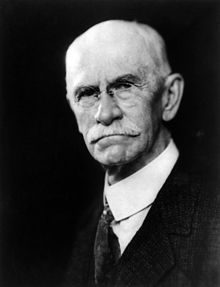Charles S. Thomas
| Charles Spalding Thomas | |
|---|---|
 |
|
|
United States Senator from Colorado |
|
|
In office January 15, 1913 – March 3, 1921 |
|
| Preceded by | Charles J. Hughes, Jr. |
| Succeeded by | Samuel D. Nicholson |
| 11th Governor of Colorado | |
|
In office January 10, 1899 – January 8, 1901 |
|
| Lieutenant | Francis Patrick Carney |
| Preceded by | Alva Adams |
| Succeeded by | James Bradley Orman |
| Personal details | |
| Born | December 6, 1849 Darien, Georgia |
| Died | June 24, 1934 (aged 84) Denver, Colorado |
| Political party | Democratic |
| Alma mater | University of Michigan |
| Military service | |
| Service/branch | Confederate States Army |
| Battles/wars | American Civil War |
Charles Spalding Thomas (December 6, 1849 – June 24, 1934) was a United States Senator from Colorado. Born in Darien, Georgia he attended private schools in Georgia and Connecticut, and served briefly in the Confederate Army.
Thomas graduated from the law department of the University of Michigan at Ann Arbor in 1871, and was admitted to the bar the same year. He moved to Colorado and began to practice in Denver, where he was a city attorney in 1875 and 1876. He was a member of the Democratic National Committee from 1884 to 1896, and was an unsuccessful candidate for election to the United States House of Representatives in 1884, to the Senate in 1888 and 1895, and to the governorship in 1894.
Thomas served as the 11th Governor of Colorado from 1899 to 1901. In 1913, he was elected as a Democrat to the United States Senate in 1912 to fill the vacancy caused by the death of Charles J. Hughes, Jr.; in 1914, he was reelected to a full term. Thomas served from January 15, 1913, to March 3, 1921, and was the last Confederate veteran to serve in the Senate. In 1920, he was an unsuccessful candidate for reelection on the Nationalist ticket, receiving only 3% of the vote.
In the Sixty-third and Sixty-fourth Congresses, Thomas was chairman of the Committee on Woman Suffrage, and a member of the Committee on Coast Defenses (Sixty-fifth Congress) and the Committee on Pacific Railroads (Sixty-sixth Congress). He resumed the practice of law in Denver, where he died on June 24, 1934; his remains were cremated and his ashes were scattered in the mountains.
...
Wikipedia
